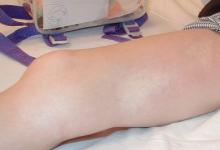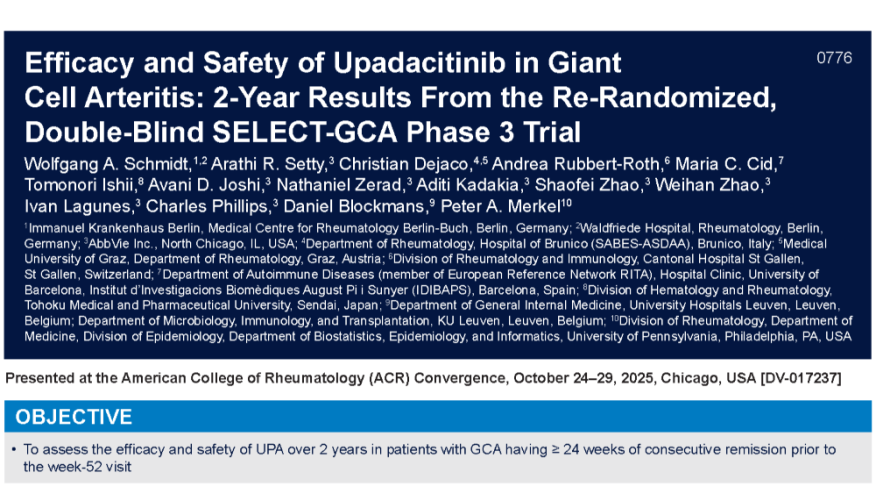No Extra Cancer Recurrence Risk with Biologics in RA Save

Key Takeaways
- Worries have persisted that cancer survivors in remission might face increased recurrence risk when treated with biologic drugs for autoimmune disease.
- This Danish study of rheumatoid arthritis patients showed no suggestion of greater cancer recurrence risk with biologic drugs, relative to conventional disease-modifying agents.
- Note that the study did not examine patients using nonbiologic targeted drugs such as JAK inhibitors.
Rheumatoid arthritis (RA) patients in Denmark with a history of solid tumor cancers, now in remission, faced no greater likelihood of cancer relapse when they were treated with biologic agents, compared with conventional disease-modifying anti-rheumatic drugs (DMARDs).
Recurrence rates for patients receiving biologics stood at 11.9 per 1,000 patient-years, versus 13.8 for patients on conventional DMARDs, according to Rasmus Westermann, MD, PhD, of Aalborg University Hospital in Denmark, and colleagues.
Adjusting for a host of potential influences on recurrence risk -- including age, cancer type and original stage, and duration of remission -- still indicated no increased risk for cancer relapse with biologics, the researchers reported in RMD Open, with a hazard ratio of 0.92 (95% CI 0.38-1.73) relative to conventional DMARD therapy.
Moreover, results were similar when the group looked specifically at tumor necrosis factor (TNF) inhibitors (HR 1.10, 95% CI 0.21-3.16) and the anti-B-cell drug rituximab (Rituxan; HR 0.94, 95% CI 0.32-2.11).
"Apprehension about bDMARD [biological DMARD] treatment in patients with RA and a history of cancer still presents a daily challenge in clinical care," Westermann and colleagues noted. Consequently, the study findings should offer some comfort about this aspect of treatment safety, they suggested.
The researchers were especially pleased that rituximab showed no hint of increasing risk for recurrence. They observed that the drug's elimination of B cells also leads to "compromised immunosurveillance," which "could theoretically have promoted [the] recurrence risk.... [But] this does, reassuringly, not seem to be the case."
Admittedly, worries that biologics could raise cancer relapse risk were mainly theoretical, considering their immunomodulatory effects, without very much evidence from real-world patients. But previous studies that found no basis for concern had methodological issues (such as lumping recurrences together with new primary cancers of a different type) that left open the possibility of a real increased risk.
For the current study, Westermann and colleagues analyzed national registry data in Denmark, in which they identified 720 patients who had previously had a solid tumor cancer brought into remission. The study's active-comparator, new-user design compared those who started a biologic drug or a conventional DMARD. Among patients on conventional DMARDs, a total of 2,750 patient-years of data were available; for those on biologics, data covered 840 patient-years.
Some 70% of patients used conventional DMARDs such as methotrexate or hydroxychloroquine and the rest were on biologics. Most of the latter were treated either with TNF inhibitors or rituximab; a smattering took abatacept (Orencia) or one of the interleukin-6 inhibitors.
About 90% of patients were women. Median age when starting an RA drug was about 65 years for those on biologics and 69 for patients using conventional DMARDs. More than two-thirds of biologics users had developed RA prior to their cancer diagnosis; this was true for only 38% of conventional DMARD users. Just over half of the cancer diagnoses were for breast tumors, with melanoma and colorectal cancer together accounting for another 30%. Median time since achieving cancer remission was about 3.2 years.
With 5 years of follow-up, cumulative recurrence rates were nearly identical irrespective of treatment, and this was the case when TNF inhibitors and rituximab were considered separately. In earlier years, though, recurrences piled up faster for conventional DMARD users than for patients given rituximab, such that by year 5, recurrences appeared to accelerate for those on rituximab.
However, the findings must be interpreted with caution, Westermann's group warned, because cancer recurrence was rare overall. Just four patients had them while on TNF inhibitors, and only seven using rituximab relapsed. In the conventional DMARD group, 38 patients had recurrences. As a result, the confidence intervals for hazard ratios were very wide. Consequently, the researchers wrote, "we cannot rule out a clinically important excess risk of cancer recurrence with bDMARD treatment in patients with RA, and additional observational studies focusing on cancer recurrence are highly warranted."
Other limitations included the potential that patients received a particular type of RA therapy for reasons that also influenced their cancer recurrence risk. Also, since the study focused on recurrence, the findings don't extend to risks for developing new primary cancers.
Source Reference: Westermann R, et al "Cancer recurrence risk with bDMARD treatment in patients with rheumatoid arthritis and a history of cancer: a nationwide Danish register-based cohort study" RMD Open 2025; DOI: 10.1136/rmdopen-2024-005247.










If you are a health practitioner, you may Login/Register to comment.
Due to the nature of these comment forums, only health practitioners are allowed to comment at this time.